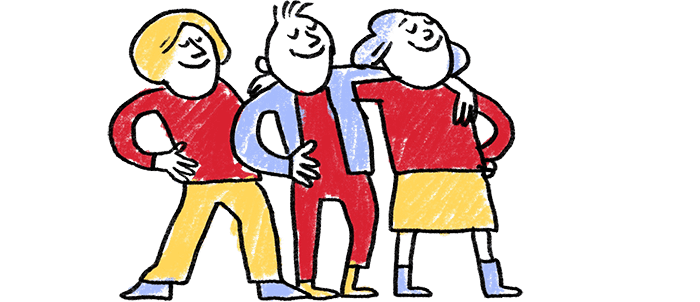Bullying in school and recreational activities
Bullying and violence can have a lasting impact on the psyche of children and adolescents. It should not be accepted school and recreational activities. All workplaces for children and adolescents have an anti-bullying plan. Parents who receive indications or information about bullying should take it seriously and report it to the relevant parties. Workplaces of the Department of Education & Youth of Reykjavík City operate according to a bullying checklist developed in extensive consultation with professionals.
What is bullying?
Bullying is when an individual is targeted by a single individual or a group of people with:
- Repetitive teasing
- repeatedly demeaning behavior
- repeated demeaning words or lies
- repeated psychological bullying
- repeated threats
- repeated social rejection or exclusion.
Bullying also appears in social media interactions. It is the role of adults to ensure that children use the internet responsibly.
What should I do if my child is being bullied in primary school or recreational activities?
- Talk to the child. Listen carefully to the child and show love and understanding.
- Talk to a school administrator, homeroom teacher, director or prosperity liaison. They will look into whether bullying is happening. If the bullying is confirmed, the school draws up a plan of action to eradicate the bullying. You can also reach out to administrators for primary school and recreational activities at your district center: East Center, North Center, South Center, West Center.
- The school will plan how to combat the bullying. It is best to get the sufferer's permission to raise the issue. However, we must always bear in mind that it is the adults who are supposed to protect the child.
What do I do if a school notifies me that my child is involved in bullying?
When the school tells you your child is bullying, it is normal to feel disappointed and shocked. It is important to note, however, that it is not helpful for the child to excuse, justify, or make light of the behavior. Addressing the issue seriously will help not only the tolerant, but also your child.
Research shows that children who exhibit violent behavior towards their peers are at risk of long-term antisocial behavior. Therefore, it is necessary to guide the child towards better communication. The first step in this direction is to start a positive and purposeful partnership with the school.
Effects of Bullying
If a child is bullied, it will not be long before the child start to feel unwell, become fearful, unsafe, lonely, and defensive against the other children. Confidence disappears, the child retracts and even becomes ill without visible illnesses.
Prolonged bullying causes stress, which can lead to serious problems such as unwanted behavior, loss of appetite, and depression.
Who makes contact?
It is usually not recommended for the parents of sufferers to contact the perpetrators' parents themselves – or vice versa. We recommend having an administrator/homeroom teacher in charge. A teacher calls a meeting with a child and parents, explains the situation, and seeks agreement on measures to stop the bullying. The agreement is then followed up in partnership with the parents.
Friendly community
The Friendly Community project resulted from the merger of preschools, primary schools, and recreational activities into a single department; Reykjavík City’s Department of Education & Youth. Friendly community refers to a community where everyone's conduct is characterized by respect, compassion, and responsibility. It does not allow bullying, but when needed, bullying is addressed in an orderly manner in accordance with the school/after-school program anti-bullying plan and Reykjavik policies.

Any other questions?
Contact us: upplysingar@reykjavik.is
Telephone: 411 1111
Reykjavík’s Department of Education & Youth employs a parent-school advisor. The advisor works on resolving cases of bullying in partnership with parents and Reykjavík City institutions.